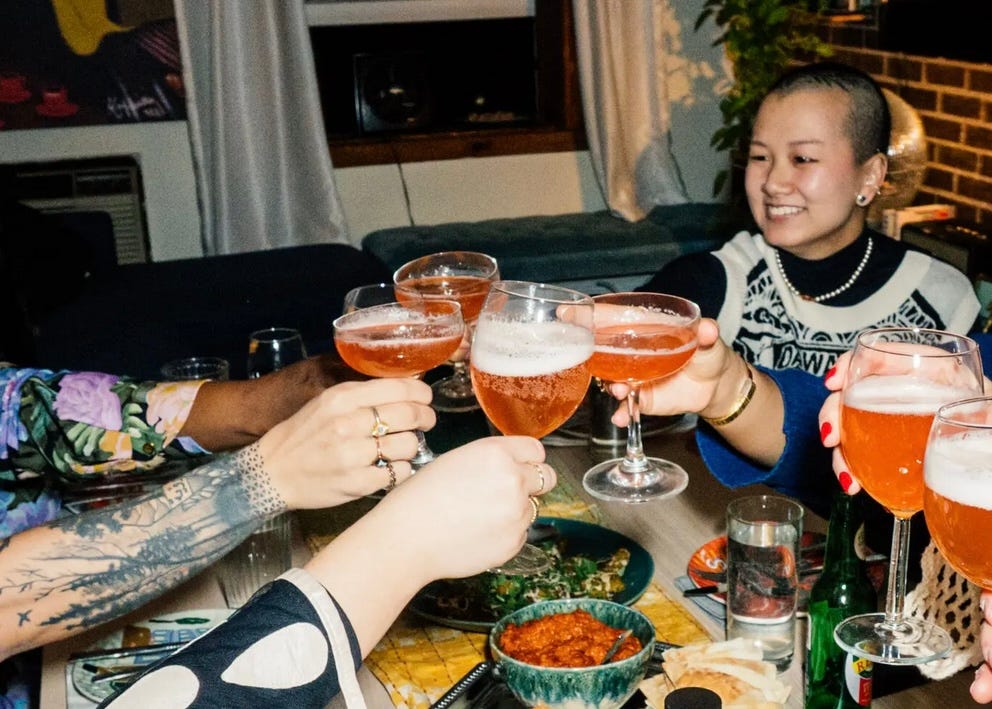Welcome to The Aftergrad Weekly, a curated media bundle to keep you informed, inspired, and entertained. Every Tuesday, we share a selection of articles, something to watch, an interesting quote, and links worth consuming.
QUOTE OF THE WEEK
A paraphrasing of Chinese philosopher Zhuangzi’s thoughts on the essential self and what it means to be in the world and not of the world.
Adopting a healthy scepticism towards inherited ideas means “emptying the container of the Self”, or perhaps exercising a kind of trained “forgetting” of that which is extraneous to the essential self. In this state, we become less prone to partaking in the superfluous occupations we impose upon ourselves to cope with the weight of social expectations.
WEEKLY READ
The Radical Act of Eating With Strangers | by Setareh Baig

Fixing a meal for yourself or family is an everyday choir — or enjoyable pastime for some. But breaking bread with someone you barely know is not a common practice. When Dinner With Friends was introduced in New York City in May 2022 by Anita Michaud, the desire to attend a dinner where no one knew each other suddenly gained popularity, which isn’t surprising considering how the pandemic disrupted personal relationships and social circles.
This article reports on the benefits of eating with strangers and how the activity can improve one’s outlook on personal relationships, expand a person’s friendship network, and promote joy.
When pursuing new relationships, optimism can work both ways: It can prompt you to seek out new friends, and it can also draw new friends to you. People who demonstrate optimism may also enjoy higher quality interactions, according to Dr. Emma Seppala, a lecturer at Yale University’s School of Management and the author of “The Happiness Track.” People are often attracted to those who are “positively re-energizing,” in what Dr. Seppala describes as a heliotropic effect: Just as plants are drawn to the sun, we are drawn to those who have life-giving qualities.
Dr. Seppala also called attention to an important distinction around cultivating new friendships: It’s not about how many relationships you have, but about how connected you feel to the ones you do have, she explained. “I think that’s really good news because there’s not always something we can do about how many people we interact with,” she said. She cited the example of a person at home taking care of a baby, or who considers herself an introvert.
Read the full article here.
WEEKLY WATCH
Working: What We Do All Day on Netflix
A four-part docuseries which follows former President Barack Obama as he speaks to American workers in different sectors like tech, health care, and service — highlighting why people work, the struggles they face, and how they find meaning from their jobs.
NEW EPISODE
S2 Ep. 11: Decode the Future, Part I
It can be quite intimidating to think about the future, especially when there is so much uncertainty and rapid innovation in technology. But it’s a practice that helps us expand our imagination around what’s possible and prepare for the inevitable shifts in culture, work, and beyond. In thinking about potential possibilities for society and ourselves, we briefly discuss some speculative futures and introduce a game called Decode the Future that we’ll ultimately play in our next episode.
Often times, history has happened to people. And so, why I get so inspired by thinking about the future is because there’s an opportunity to create something better than the present, even though it can be a bit overwhelming. And as of late, the present — in certain moments — has been so depressing and violent.
Listen to The Aftergrad Podcast on Spotify, Apple, YouTube, or wherever podcasts are found.
Subscribe to The Aftergrad Newsletter for free to receive posts like these, advice columns from Dear Aftergrad, and much more directly in your inbox.
Until next time,
Your fellow aftergrads, Robert Cain & Victoria Gilbert







